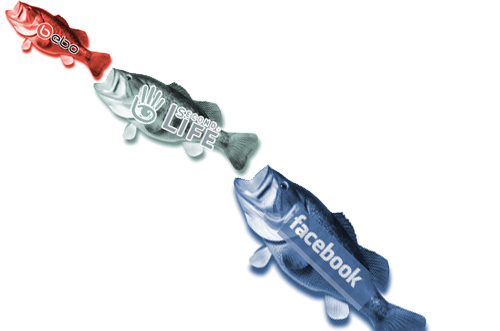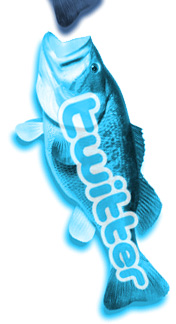
 There’s that old illustration that school kids used to be shown where a small fish was eaten by a larger one that was in turn consumed by a larger one still – carnivores and the food chain. It feels a bit the same at the moment for Web 2.0 technologies, particularly in the political arena. The first well known social network in the UK was Bebo, but this was then (in politics at least) usurped by Second Life and John Edwards’s HQ there was attacked.
There’s that old illustration that school kids used to be shown where a small fish was eaten by a larger one that was in turn consumed by a larger one still – carnivores and the food chain. It feels a bit the same at the moment for Web 2.0 technologies, particularly in the political arena. The first well known social network in the UK was Bebo, but this was then (in politics at least) usurped by Second Life and John Edwards’s HQ there was attacked.
Then Facebook boomed in a major fashion, starting 12 months ago – every political campaign wanting to look cool needed its Facebook group. At the start of 2008 UK Facebook use declined. Now it seems that Twitter is the technology of the moment – the Twitter logo seems to be appearing with increasing regularity, and even Downing Street has a Twitter channel… I’ve never quite understood the point of Twitter personally – my status updates would be really tedious. But anyway, I better get to grips with it before an ever larger fish eats it up in the cool-ness stakes in the latter half of this year.








>getting a text message every time a friend (or in the case of politicians, usually people I don’t) goes to the loo is probably more than I really want to know…
I think that “what are you doing” is a red herring. The benefit of twitter is all the other things it can be used for, and that many things can be done more informally and easily in the fly.
Matt
Personally I am quite tired about all these social networks… after some experimentation I think I have reach a quite stable model suitable for my needs:
__personal blog (WordPress platform on a bought domain) for the public
__private emails (different gmail adresses for the main different aspects of my life managed from a root gmail account) for the private
__lastly, I exploit social networks as “shop windows” just putting on them the feed of my blog
Hmmm. I must say the post was inspired by an idea of graphic design, and being annoyed by Twitter. It was probably not my most analytical effort!
I’ve written more here
Interesting to see how different people see it differently… I quite agree that I can’t see the point about Twitter – getting a text message every time a friend (or in the case of politicians, usually people I don’t) goes to the loo is probably more than I really want to know… A good example of politicians jumping on an a technological bandwagon with no idea why and just because they don’t want to be seen to be left behind, I think.
From my perspective bebo was also always a bit of a non-event, and you didn’t mention myspace, which although I’ve never really found it much use myself, clearly has been (and indeed still is) very big, and I think has a good claim to be the first major social networking site in the UK. And I know one UK MP who still uses it for a regular blog.
I don’t agree at all about Second Life, I’m afraid, at least in the UK – I haven’t seen any evidence that it has taken off at all in politics.
I think Facebook is far from finished yet – it is far and away the easiest to use, and also far more engaging than others, I think – but LinkedIn seems to be having a good few weeks (generally, rather than for political involvement).
I’ve written about this, for example at:
http://www.jeremyhargreaves.org/blog/2008/are-you-linkedin/
and
http://www.jeremyhargreaves.org/blog/2008/facebook/
In answer to Ralf: partly I think you are right that it is possible to spend for ever surfing round these sites, never achieving anything apart from wasting time.
But they can also be useful for assisting life in the real world, for example by putting you better in touch with old friends you are now only vaguely in touch with (what has hitherto been largely the role of Christmas cards, at least in the UK!), and also for things like organising events and inviting people to them – I am regularly invited out to drinks (with real friends!) via Facebook, for example.
Excuse me for the Precambrian question, but does any of these ‘social media’ achieve anything meaningful except while away office and leisure hours?